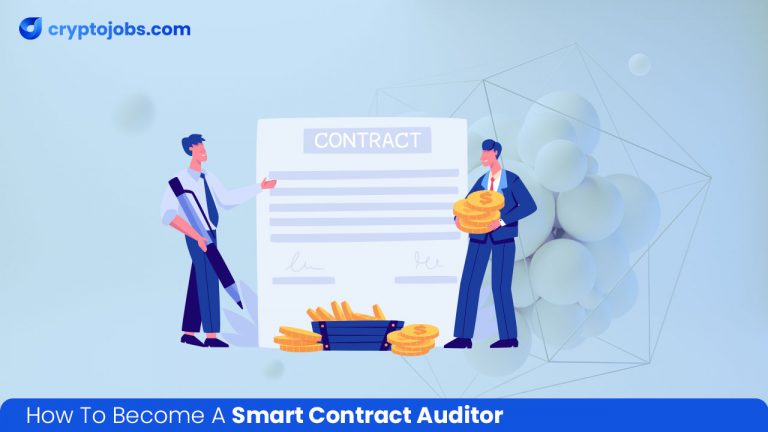
How To Become A Smart Contract Auditor
- cryptojobs.com
- February 9, 2024
- All Posts, Career Guide
- Smart Contracts
- 0 Comments
The role of a smart contract auditor is vital in the rapidly evolving Web3 landscape. The shift towards decentralized systems has prompted a surge in demand for professionals who can ensure the integrity and security of smart contracts. Smart contracts, with their self-executing and immutable nature, have redefined the way transactions occur on blockchain platforms. That’s why their integrity is crucial for maintaining trust in decentralized ecosystems.
With the rising number of smart contract auditor jobs, it surely is a promising career to set your sights on. In this blog, we’ll delve into the essential skills, educational pathways, practical experiences, and strategic steps to not only enter this specialized field but also thrive in it.
What are Smart Contracts?
Understanding smart contracts is the first step on your way to becoming a smart contract auditor. Simply put, smart contracts are self-executing contracts with the terms of the agreement directly written into code. They operate on blockchain technology, automating the execution of predefined actions once specific conditions are met. Think of them as digital agreements that run without the need for intermediaries like banks or legal authorities. Smart contracts play a pivotal role in decentralized systems, ensuring transparency and trust in the execution of transactions within the blockchain network.
Educational Pathway
The educational pathway toward becoming a smart contract auditor involves a balanced approach between formal education and online courses. The synergy of these educational avenues creates a well-rounded educational profile that combines theoretical knowledge with practical skills. This combination enhances your readiness to navigate the dynamic landscape of smart contract auditing. Here’s how:
Formal Education
Formal education in computer science, blockchain, or related fields is a promising start if you want to lay a solid foundation. Many colleges and universities offer academic programs with structured courses that cover the fundamentals of programming, cryptography, and blockchain technology. Some of the courses are specifically tailored to blockchain and distributed ledger systems, too. These programs are designed to equip students with the necessary theoretical background about this dynamic landscape. They form a solid foundation on which you can build your smart contract auditing career.
Online Certifications
Online certifications and training courses offer a more flexible and accessible route. Platforms like Coursera, Udacity, and others offer courses tailored for smart contract auditing. These online resources cover practical aspects, guiding learners through hands-on exercises. They’ll walk you through programming languages such as Solidity, Ethereum basics, and security principles, which are essential for your training as an auditor. They are great for honing your skills at your own pace.
Beyond formal education and online courses, the journey to becoming a proficient smart contract auditor involves a commitment to continuous learning. Stay updated on the latest advancements in blockchain technology through blogs, forums, and industry publications. This dynamic field requires adaptability, and a proactive approach to learning ensures that you remain at the forefront of developments.
Skills Required
If you want to succeed in smart contract auditor jobs, you will need to develop a distinctive set of skills. These include:
Technical Proficiency
To embark on a career as a smart contract auditor, you must possess technical proficiency. Since the job is all about coding, knowing other programming languages, such as Javascript, C++, and Python, will prove to be useful in this field. Once you are comfortable with these, you can focus on other languages that are specific to smart contract auditing. Develop a solid command over Solidity, the programming language used for writing smart contracts on the Ethereum blockchain. You should also learn Rust and Vyper, as they are also frequently used for building smart contracts.
Smart contract auditors often work with the blockchain network Ethereum. It contains a built-in programming language for developing decentralized apps or dApps. Focus on learning how Ethereum Virtual Machine uses Solidity to draft smart contracts.
Security Awareness
The basic purpose of smart contract auditing is to ensure its safety and resilience. So, it’s essential that you learn to identify vulnerabilities and potential risks within the code. As a smart contract auditor, you should be able to conduct a meticulous examination of the contract’s logic, ensuring that it is resilient to potential exploits and malicious attacks. Having an eye for detail and a methodical approach is key to spotting vulnerabilities that might compromise the integrity and security of the smart contract.
Analytical Skills
Smart contracts often involve intricate logic and algorithms, so you need a keen analytical mind to audit them. The ability to think critically and analytically is paramount in auditors because their role is vital in ensuring the reliability and security of smart contracts in the decentralized landscape.
Analytical skills enable you to assess the functionality and security implications of the code effectively. They give you the ability to dissect complex code structures and understand how different elements interact. With a keen mind, you can scrutinize the code for potential bugs, inefficiencies, or loopholes that could be exploited.
Gain Practical Experience
To become a skilled Smart Contract Auditor, hands-on experience is key. It’s like learning to ride a bike – theory is essential, but you truly grasp it when you get on the saddle. Consider diving into open-source projects or joining blockchain communities. By actively participating and contributing, you get to apply what you’ve learned in a real-world setting. Collaborating with experienced auditors provides a chance to shadow and learn from those already cruising down the blockchain path. Practical experience not only hones your skills but also builds confidence in navigating the complexities of smart contract auditing. So, buckle up and get ready to pedal through practical scenarios that will solidify your understanding and prepare you for the road ahead.
Job Opportunities and Freelancing
There are various diverse paths that you can explore to land smart contract auditor jobs.
- Bug bounty platforms serve as dynamic spaces where auditors can actively identify vulnerabilities in smart contracts, earning rewards based on their findings.
- Community platforms and social media provide valuable networking opportunities, allowing auditors to connect with blockchain communities, share insights, and discover potential Web3 job openings.
- Freelance platforms offer a flexible approach, enabling auditors to take on projects independently, showcasing their skills and building a portfolio.
- Job platforms dedicated to blockchain and smart contract auditing present formal employment opportunities within established companies.
As you can see, whether you prefer the autonomy of freelancing or the stability of traditional employment channels, this multifaceted career provides a range of options. Leverage them to your benefit and land a job that fits your needs.
Conclusion
In conclusion, the path to becoming a proficient Smart Contract Auditor involves a combination of acquiring technical skills, gaining practical experience, and staying abreast of industry developments. As an aspiring auditor, you can embark on this journey by honing your coding skills, seeking educational pathways, and actively participating in blockchain communities. Remember that continuous learning and adaptability are key to thriving in the ever-changing landscape of blockchain technology.
Finding a job in the competitive web3 space can be stress-free with cryptojobs.com, as the platform is trusted by top Web3 and crypto companies for hiring the best talent. Start your job search today and find a position that matches your skillset.




